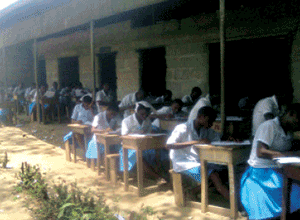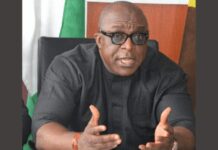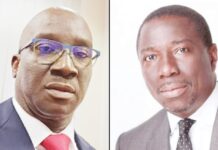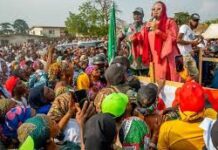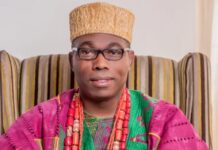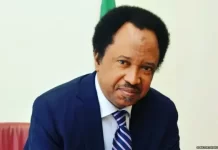Special Correspondent, SAM NWOKORO, looks at the salutary aspects of the Jonathan administration’s transformation agenda and the areas it has not lived up to expectation
The President Goodluck Jonathan-led transformation agenda, which focuses on enhancing economic growth, snubs partisan parochialism, his foot soldiers have argued. For them, primordial politics of attrition has been dwarfed by the present federal government’s transformation agenda.
Students studying outside class
In those days, allocation of funds and siting of federal amenities were used as tools to ruffle opposition. Such reprisal approach to politics and exercise of power had in the past been the bane of Nigerian politics and leadership, observers have noted, adding that the neglect affected development direly.
According to them, industries had been sited in places where there were no raw materials for the kind of products or services for which they were initiated. An instance is the iron and steel industry. In the 1980s, Nigeria embarked on the development of the iron and steel industry. They were cited in Itakpe, Kogi State; Aladja, Delta State; and Jos, Plateau State. The communities that hosted these plants were agrarian, not industrial hubs, critics argue, stressing that none was located in the South East which boasts more artisans and small scale technology-based enterprises as in Nnewi, Orlu, Aba, Umuahia or Awka.
The same case of lopsidedness, it has been observed, prevailed in the siting of critical infrastructure like the ports. This kind of lack of priority in deciding and executing development plans prevailed with succeeding military governments and even worse during the past civilian administrations. There was little thought about separating economic decisions from politics.
Jonathan’s supporters, however, argue that one thing that sets this present administration apart from its predecessors is the federal government’s inclination to separate politics from economic decisions.
Ganiyu Toafik, Peoples Democratic Party (PDP) Publicity Secretary in Lagos State, in an earlier interview with TheNiche, had remarked that in contrast to criticism of the federal government on economic performance, states controlled by the opposition All Progressives Congress (APC) are worse off.
Other admirers of the administration agree with the Lagos PDP spokesman. Musa Ibrahim, a youth leader of Lagos PDP, for instance, told our reporter that landmark “projects the federal government is handling in some states in South West and all APC states are enough to return the PDP in 2015, if we judge things by evidence”.
He listed Apapa-Oshodi Expressway expansion among the areas of federal government presence.
The highway was constructed in the 1970s. It has been derelict since the mid-90s. Though the Olusegun Obasanjo regime voted billions of naira for its rehabilitation, until he left office in 2007, the road remained in its derelict state until the inception of Arc. Mike Onolememen as Works Minister.
He also mentioned Lagos-Ibadan Expressway expansion as one of the feats of the central government.
The expressway project had been mired in botched concession agreements that had left the road undone, leading to its revocation and consequent re-award to Julius Berger Plc. The 10-lane expansion survey is already done and the shape of the new road is fast taking shape on a fast pace to meet the 2017 completion date. Some emergency remedies earlier done have eased the nightmare of travellers considerably, especially across some troublesome portions.
Mrs. Tinuke Abari, a yam dealer who was returning from Ibadan, told TheNiche: “I am impressed by what I am observing on the road now, though it is not entirely a smooth ride because we still experience bottlenecks in some instances. But it is no longer as hectic and energy-sapping as it used to be when the road was a virtual death trap. We can’t be spending the whole day just to move our yam from Molete to Lagos. Until now, before you arrived Lagos, it was already night. But the situation has changed substantially.”
Another infrastructure landmark of the Jonathan government which cuts across opposition strongholds is the revamped Lagos-Kano rail line that has been moribund since the 1990s, his supporters note.
Even at that, critics insist that given the volume of resources at the disposal of the Jonathan administration, what his foot soldiers are celebrating as marks of good governance pale to insignificance in relative terms. They, for instance, note the rising cost of living, widening employment market, fallen education system and crippling state of insecurity as indications of the government losing focus on how to re-engineer the nation.
The Boko Haram challenge is particularly an area that commentators are agreed that the government has not walked its talk. On occasions, for example, Jonathan’s image handlers had sounded tough on efforts of the administration to tackle insurgency. But even as they beat their chests in announcing their readiness to stem the menace, terrorists had retorted with more blistering attacks. In the last one week, for instance, Boko Haram operatives had hit many targets in attacks that had claimed many lives and property.
“Whatever Jonathan and his propaganda machine are advertising as their achievements amount to nothing if we cannot go to bed and sleep with our two eyes closed. The situation used to be that of one week, one trouble; but now, it is that of one day, many troubles. Look at the number of people being killed every day by Boko Haram. Are they not fellow Nigerians? Even if they claim to have tarred roads from Lagos to Maiduguri, which is not true any way, should we use that to close our eyes to the number of our people that are being slaughtered on daily basis?” Bassey Eno, an unemployed Akwa Ibom indigene, asked in a chat with our reporter.
His major grouse is that in the midst of the dicey situation, the main concern of elected officials has been re-election in 2015. The presidency seems to be the major culprit in this regime of confusion. Critics blame policy insincerity and poor leadership recruitment processes of the ruling PDP for the ugly turn of events.
Incidentally, at the formation of the party on July 29, 1998, the facilitators were guided by far-reaching visions. They had, for instance, dreamed of a party that would put the Nigerian nation on a new phase of political engineering. Part of their intention was to put in place a political platform that would ensure a “re-creation of civil political institutions, reconciliation of Nigeria, re-kindling of the spirit of unity and brotherhood in the polity and the revitalisation of powers of the people to build a prosperous industrial democracy”.
However, the inability of the party to harness the potential at its disposal has been identified as the bane of the nation’s democracy growth and good governance. The result is that 15 years after the onset of this current civilian dispensation, Nigeria, in the estimation of many, is yet to find its bearing.

